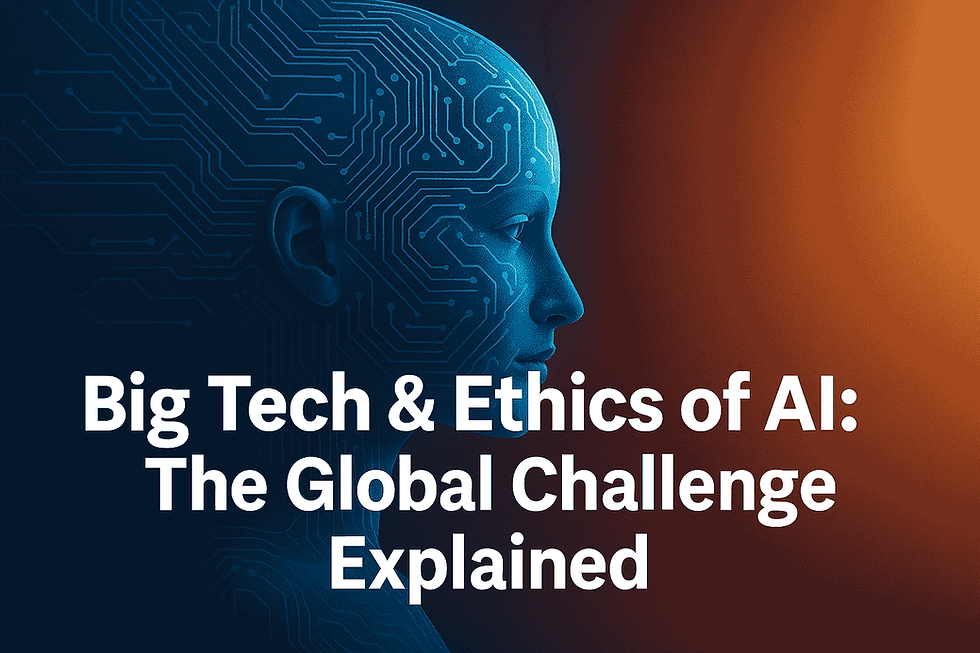Big Tech and the Ethics of AI: Understanding the Global Regulatory Challenge
- TPP

- Nov 9, 2025
- 4 min read
As Artificial Intelligence reshapes industries and society, concerns around Big Tech monopolies, data ethics, and copyright misuse are growing. This article explores the ethical dimensions, stakeholder perspectives, global regulations, and India’s policy challenges — a complete guide for UPSC Ethics (GS Paper 4) and Current Affairs preparation.

The rapid rise of Generative AI has brought not only innovation but also complex ethical dilemmas. Recently, the U.S. courts began investigating Google’s monopoly in AI-powered search, while two authors sued Apple, alleging that their books were used without consent to train the company’s “OpenELM” AI model — a clear violation of copyright and intellectual property rights (IPR).
These incidents reflect a global pattern: Big Tech companies, driven by profit and innovation, are increasingly facing scrutiny for using copyrighted data and consolidating digital monopolies, raising questions of fairness, accountability, and ethics in AI governance.
Key Stakeholders and Their Interests
Stakeholder | Core Interests / Ethical Concerns |
Big Tech AI Companies | Expanding market dominance, controlling algorithms and datasets, maximizing profits while maintaining public trust. |
Content Creators | Protecting copyright, receiving fair compensation, and ensuring their work isn’t exploited by AI models. |
Consumers / Users | Access to safe, transparent, and affordable AI tools while ensuring data privacy. |
Governments | Maintaining fair competition, preventing monopolies, protecting citizens’ rights, and balancing innovation with regulation. |
Society at Large | Ensuring equitable distribution of AI’s benefits, preventing misinformation, bias, and erosion of democratic values. |
Ethical Issues in the Functioning of AI LLMs
1. Digital Monopolies and Unfair Competition
Large AI firms like Google, OpenAI, and Microsoft dominate global AI ecosystems through control over algorithms, infrastructure, and vast datasets. This suppresses smaller innovators and violates the principle of distributive justice (fair allocation of opportunities and resources).
Example: Google’s position as the default search engine in most devices effectively creates a digital monopoly, limiting consumer choice.
2. Copyright and Intellectual Property Violations
Generative AI models often scrape online books, art, code, and music to “train” algorithms — frequently without permission or compensation. This disregards Kantian ethics, which emphasizes treating individuals (and their creations) as ends in themselves, not merely as means for profit.
Example: Apple’s “OpenELM” lawsuit where authors alleged their copyrighted books were used without consent.
3. Privacy and Sensitive Data Risks
AI systems may inadvertently expose personal or confidential information if training data includes sensitive content. Such breaches violate transparency and consent principles.
Example: South Korea banned downloads of China’s “DeepSeek” AI app after it admitted to violating national privacy norms.
4. Privatization of Public Knowledge
Freely available public data — like Wikipedia entries or open-source research — is often repurposed by corporations into proprietary AI tools, effectively commercializing collective human knowledge.
5. Corporate Profit vs. Ethical Responsibility
In the race for market control, corporations often compromise moral integrity, prioritizing shareholders over societal fairness.
6. North–South Divide and Digital Colonialism
Most data used to train AI models originates from the Global South, yet profits and patents remain concentrated in the Global North. This widens economic inequality and creates a new form of digital colonialism — control over digital resources instead of physical territories.
Regulation of AI: India and the World
India’s Status
No Dedicated AI Law Yet: India currently lacks a comprehensive legal framework governing consent, licensing, and ownership of AI training data.
Existing Legal Provisions:
IT Act, 2000 – Regulates digital activity and cybercrime.
Digital Personal Data Protection Act, 2023 – Protects individual data rights.
Copyright Act, 1957 – Safeguards creative ownership.
Competition Act, 2002 – Prevents monopolistic practices.
While these laws cover AI tangentially, India needs AI-specific norms for ethical innovation and accountability.
Global Frameworks
EU AI Act (2024): The world’s first comprehensive law on AI, ensuring transparency, accountability, and safety of AI systems.
UNESCO’s 2021 Recommendation on AI Ethics: Sets global moral standards for fairness, non-discrimination, and human oversight — adopted by India.
G20 AI Principles & Bletchley Declaration (2023): Promote inclusive and human-centric AI development.
ParisAI Action Summit 2025: Advocates “AI for People and Planet,” emphasizing sustainability and global equity.
The Way Forward
Strengthen Legal Frameworks
Enact a Comprehensive AI Law aligned with the EU AI Act, addressing data consent, licensing, IPR, liability, and accountability.
Ensure Fair Compensation & Data Licensing
Build mechanisms for royalty and credit for creators whose work trains AI models.
Promote Fair Competition
Empower the Competition Commission of India (CCI) to monitor Big Tech practices.
Encourage open-source AI and public data commons to democratize access.
Safeguard Privacy and Data Security
Enforce data anonymization, consent-based access, and independent audits for AI firms.
Democratize AI Knowledge
Protect open databases, research repositories, and public archives.
Launch AI literacy programs for citizens and students.
Ethics in Corporate AI Governance
Mandate Ethics Review Boards within major AI companies — similar to medical ethics committees — to ensure moral oversight of innovation.
Global Cooperation
Advocate for a UN-led Global AI Treaty to ensure equitable access and benefit-sharing.
Promote South–South partnerships in AI research and infrastructure.
Institutional Capacity Building in India
Establish a National AI Regulation Authority (NAIRA) for cross-sector coordination.
Support public–private partnerships for ethical, indigenous AI development.
Artificial Intelligence, especially Generative AI, holds transformative potential — from healthcare to governance. Yet, its unchecked growth under Big Tech monopolies risks deepening inequality, breaching privacy, and eroding ethical values.
India and the world must aim for a balanced AI ecosystem — one where innovation coexists with integrity, transparency, and justice. As the philosopher Immanuel Kant would remind us, technology must always serve humanity — never the other way around.
Click for Daily Quotes:
Stay updated with the latest news by joining our Telegram channel – The PRESS Pad , and follow us on Instagram and X.



Comments